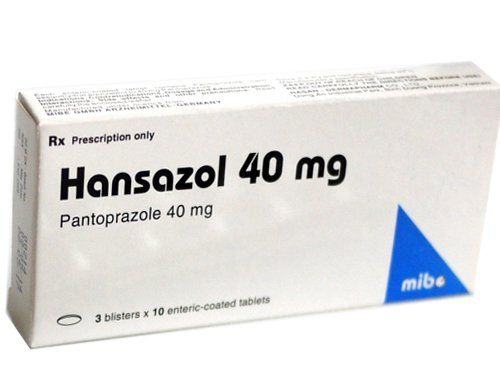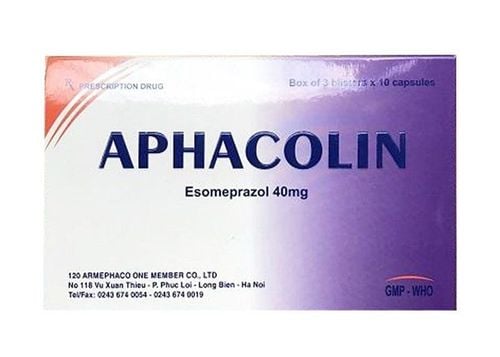This is an automatically translated article.
Gastrolac has the active ingredient pantoprazole, a proton pump inhibitor used in the treatment of gastroesophageal reflux disease, peptic ulcer disease, Zollinger-Ellison syndrome, and the prevention of ulcers caused by NSAIDs. So what are the uses, dosages and precautions when using Gastrolac?1. What are the effects of Gastrotac?
What does Gastrotac do? The drug Gastrolac has the main active ingredient is Pantoprazole, in the form of lyophilized powder with a strength of 40mg. Pantoprazole is a proton pump inhibitor, which inhibits the terminal phase of acid secretion in gastric parietal cells by covalently binding to the H+/K+/ATPase pump. The drug has the ability to inhibit normal gastric acid secretion and by stimulants. Binding to the H+/K+/ATPase pump will prolong the anti-acid effect of the drug for more than 24 hours. With a single intravenous dose of 20 to 120 mg pantoprazole in healthy subjects, the onset of action occurs within 15 to 30 minutes, and gastric acid suppression persists for 24 hours, depending on the dose.2. Uses of the drug Gastrolac
Gastrolac is indicated in the treatment of the following conditions:
Gastroesophageal reflux disease (GERD). Peptic ulcer . Prevention of ulcers caused by non-steroidal anti-inflammatory drugs. Zollinger-Ellison syndrome and other diseases causing hyperacidity. The use of Gastrolac is contraindicated in patients with hypersensitivity to pantoprazol, any component of the drug or other benzimidazole derivatives such as Esomeprazole, Omeprazol, Lansoprazole, Rabeprazol.
3. Dosage and usage of Gastrolac
Dosage
Gastroesophageal reflux and gastric and duodenal ulcers: The recommended dose of Gastrolac is one 40mg vial per day intravenously. Treatment of Zollinger - Ellison syndrome and other conditions causing increased gastric acid secretion: Long-term treatment in Zollinger - Ellison syndrome and other pathological cases of gastric acid hypersecretion should be started at a dose of 80mg per day. The dose may then be increased or decreased based on the patient's clinical response. For doses greater than 80 mg per day, the dose should be divided into two doses per day, the dose may be increased temporarily up to 160 mg but not for prolonged use. In cases where rapid control of gastric acid secretion is required, initiation of pantoprazole at a dose of 80 mg twice daily is effective to control gastric acid secretion within the target range (<10 mEq/hour). within an hour in most patients. Special subjects:
Children: There is limited experience in using Gastrolac in children. Therefore, the drug is not recommended for use in patients under 18 years of age until more clinical data are available. Hepatic Impairment: The recommended dose is 20 mg Pantoprazol daily (half a 40 mg vial of pantoprazole) and should not be exceeded in patients with severe hepatic impairment. Renal Impairment: No dose adjustment of Gastrolac is required in patients with impaired renal function. Elderly: No dose adjustment of Gastrolac is necessary in elderly patients. How to use:
For intravenous injection: Inject 10ml of physiological saline solution (0.9% NaCl solution into a 40mg bottle of Pantoprazol, intravenously slowly for at least 2 minutes.Intravenous infusion: Inject 10ml of biological saline solution. solution (NaCl 0.9%) into the vial, then dilute with 100ml of physiological saline or 100ml of Glucose 5%, intravenous infusion for at least 15 minutes.Do not mix Pantoprazol with solvents other than those mentioned above. Prepared solution should be used within 12 hours of reconstitution.It should be switched to oral administration as soon as possible
3. What are the side effects of Gastrolac?
In general, pantoprazol is well tolerated by both short- and long-term treatment. Some side effects patients may experience when using Gastrolac include:
Common: Fatigue, headache, skin rash, urticaria, joint pain, muscle pain, dry mouth, nausea, vomiting, pain Abdominal, flatulence, dyspepsia, diarrhea or constipation Uncommon: Asthenia, dizziness, lightheadedness, pruritus, increased liver enzymes. Rare: Sweating, peripheral edema, anaphylaxis, maculopapular rash, acne, alopecia, exfoliative dermatitis, angioedema, erythema multiforme, stomatitis, gastrointestinal disturbances, blurred vision, Photophobia, insomnia, agitation or inhibition, tinnitus, tremor, hallucinations, paresthesia, eosinophilia, leukopenia, thrombocytopenia, impotence, hematuria, interstitial nephritis, jaundice, hepatitis, hepatic encephalopathy, hypertriglyceridemia and hyponatremia.
4. Notes when using Gastrolac
During the use of Gastrolac, patients should note:
Long-term treatment with proton pump inhibitors, especially at high doses, may slightly increase the risk of hip, wrist and spine fractures . This condition mainly occurs in the elderly or in patients with other risk factors. Patients at high risk of osteoporosis should receive care according to guidelines and should receive adequate vitamin D and calcium supplementation. Severe hypomagnesaemia has been reported in patients treated with proton pump inhibitors for at least 3 months. Symptoms of severe hypomagnesaemia may include fatigue, muscle spasticity, convulsions, delirium, dizziness, and ventricular arrhythmias. But the above symptoms can be insidious and go unnoticed by the patient. In the majority of patients with hypomagnesaemia, the condition usually improves after magnesium supplementation and discontinuation of proton pump inhibitors. Care should be taken to check magnesium levels before initiating therapy and periodically during treatment in patients on long-term therapy or on proton pump inhibitors, concomitantly with drugs known to cause hypomagnesaemia (e.g. Diuretic). Hepatic Effects: Cases of mild and transient elevations in serum ALT have been reported during treatment with pantoprazole. Decreased gastric acid or acidosis due to long-term (more than 3 years) treatment with acid-suppressing drugs may reduce absorption of cyanocobalamin. Pregnancy: There are no adequate data on the use of pantoprazole in pregnant women. Therefore, women who are pregnant should not take Gastrolac, unless absolutely necessary. Lactation: Gastrolac is distributed in breast milk, and patients should discontinue nursing or discontinue the drug due to the potential risk to the nursing infant. Ability to drive and use machines: Gastrolac may cause side effects such as dizziness and visual disturbances. Therefore, patients should exercise caution when driving or operating machinery.
5. Drug interactions
Concurrent use of Gastrolac and some drugs can cause interactions, affect the treatment effectiveness and/or increase drug toxicity. In general, pantoprazole is extensively metabolised in the liver, mainly via cytochrome P450, thus there is a risk of interactions with other drugs metabolised by the same isoenzyme. However, clinical trials showed no clinically significant interactions between pantoprazole and these drugs. It is best for patients to inform their healthcare professional of all prescription and nonprescription medications and dietary supplements they are taking. Here are some drug interactions to note when using Gastrolac:
Gastrolac inhibits acid secretion and increases the pH of the stomach. Therefore, theoretically, the drug is likely to interact when used concurrently with drugs with gastric pH-dependent absorption such as Ampicillin, Iron, Ketoconazole. Warfarin: There is a risk of an increase in INR and prothrombin time when Warfarin is co-administered with proton pump inhibitors, including pantoprazole. Risk of abnormal bleeding and death may occur. Therefore, it is necessary to monitor the INR and prothrombin time when Gastrolac is used concomitantly with warfarin. Sucralfate may slow absorption and decrease bioavailability of Gastrolac. Therefore, a proton pump inhibitor should be taken at least 30 minutes before taking sucralfate. Above is an overview of the drug Gastrolac. This is a prescription drug for intravenous use, patients should not use it on their own, but need to visit a hospital for appropriate indications.
Follow Vinmec International General Hospital website to get more health, nutrition and beauty information to protect the health of yourself and your loved ones in your family.
Please dial HOTLINE for more information or register for an appointment HERE. Download MyVinmec app to make appointments faster and to manage your bookings easily.













